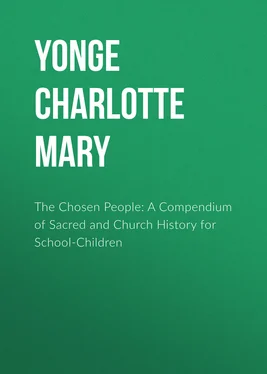Charlotte Yonge - The Chosen People - A Compendium of Sacred and Church History for School-Children
Здесь есть возможность читать онлайн «Charlotte Yonge - The Chosen People - A Compendium of Sacred and Church History for School-Children» — ознакомительный отрывок электронной книги совершенно бесплатно, а после прочтения отрывка купить полную версию. В некоторых случаях можно слушать аудио, скачать через торрент в формате fb2 и присутствует краткое содержание. Жанр: foreign_prose, foreign_religion, Философия, foreign_psychology, foreign_antique, на английском языке. Описание произведения, (предисловие) а так же отзывы посетителей доступны на портале библиотеки ЛибКат.
- Название:The Chosen People: A Compendium of Sacred and Church History for School-Children
- Автор:
- Жанр:
- Год:неизвестен
- ISBN:нет данных
- Рейтинг книги:4 / 5. Голосов: 1
-
Избранное:Добавить в избранное
- Отзывы:
-
Ваша оценка:
- 80
- 1
- 2
- 3
- 4
- 5
The Chosen People: A Compendium of Sacred and Church History for School-Children: краткое содержание, описание и аннотация
Предлагаем к чтению аннотацию, описание, краткое содержание или предисловие (зависит от того, что написал сам автор книги «The Chosen People: A Compendium of Sacred and Church History for School-Children»). Если вы не нашли необходимую информацию о книге — напишите в комментариях, мы постараемся отыскать её.
The Chosen People: A Compendium of Sacred and Church History for School-Children — читать онлайн ознакомительный отрывок
Ниже представлен текст книги, разбитый по страницам. Система сохранения места последней прочитанной страницы, позволяет с удобством читать онлайн бесплатно книгу «The Chosen People: A Compendium of Sacred and Church History for School-Children», без необходимости каждый раз заново искать на чём Вы остановились. Поставьте закладку, и сможете в любой момент перейти на страницу, на которой закончили чтение.
Интервал:
Закладка:
The Israelites could not even be roused to look for the present temporal promise, and hankered after the fine soil and rich fruits of Egypt, rather than the beautiful land of hill and valley that lay before them; and when their spies reported it to be full of hill forts, held by Canaanites of giant stature, a cowardly cry of despair broke out, that they would return to Egypt. Only two of the whole host, besides Moses, were ready to trust to Him who had delivered them from Pharaoh, and had led them through the sea. Therefore those two alone of the grown-up men were allowed to set foot in the Promised Land. Till all the rest should have fallen in the wilderness, and a better race have been trained up, God would not help them to take possession. In their wilfulness they tried to advance, and were defeated, and thus were obliged to endure their forty years' desert wandering.
Even Moses had his patience worn out by their fretful faithlessness, and committed an act of disobedience, for which he was sentenced not to enter the land, but to die on the borders after one sight of the promise of his fathers. Under him, however, began the work of conquest; the rich pasture lands of Gilead and Basan were subdued, and the tribes of Reuben and Gad, and half the tribe of Manasseh, were permitted to take these as their inheritance, though beyond the proper boundary, the Jordan. The Moabites took alarm, though these, as descended from Abraham's nephew Lot, were to be left unharmed; and their king, Balak, sent, as it appears, even to Mesopotamia for Balaam, a true prophet, though a guilty man, in hopes that he would bring down the curse of God on them. Balaam, greedy of reward, forced, as it were, consent from God to go to Balak, though warned that his words would not be in his own power. As he stood on the hill top with Balak, vainly endeavouring to curse, a glorious stream of blessing flowed from his lips, revealing, not only the fate of all the tribes around, even for a thousand years, but proclaiming the Sceptre and Star that should rise out of Jacob to execute vengeance on his foes. But finding himself unable to curse Israel, the miserable prophet devised a surer means of harming them: he sent tempters among them to cause them to corrupt themselves, and so effectual was this invention, that the greater part of the tribe of Simeon were ensnared, and a great plague was sent in chastisement. It was checked by the zeal of the young priest, Phineas, under whose avenging hand so many of the guilty tribe fell, that their numbers never recovered the blow. Then after a prayer of atonement, a great battle was fought, and the wretched Balaam was among the slain.
The forty years were over, Moses's time was come, and he gave his last summing up of the Covenant, and sung his prophetic song. His authority was to pass to his servant, the faithful spy, bearing the prophetic name of Joshua; and he was led by God to the top of Mount Nebo, whence he might see in its length and breadth, the pleasant land, the free hills, the green valleys watered by streams, the wooded banks of Jordan, the pale blue expanse of the Mediterranean joining with the sky to the west; and to the north, the snowy hills of Hermon, which sent their rain and dew on all the goodly mountain land. It had been the hope of that old man's hundred and twenty years, and he looked forth on it with his eye not dim, nor his natural force abated; but God had better things for him in Heaven, and there upon the mountain top he died alone, and God buried him in the sepulchre whereof no man knoweth. None was like to him in the Old Covenant, who stood between God and the Israelites, but he left a promise that a Prophet should be raised up like unto himself.
LESSON V
ISRAEL IN CANAAN
"But He was so merciful, that He forgave their misdeeds and destroyed them not."— Psalm Lxxviii. 38.
In the year 1431, Joshua led the tribes through the divided waters of the Jordan, and received strength and skill to scatter the heathen before them, conquer the cities, and settle them in their inheritance.
The Land of Canaan was very unlike Egypt, with its flat soil, dry climate, and single river. It was a narrow strip, inclosed between the Mediterranean Sea and the river Jordan, which runs due south down a steep wooded cleft into the Dead Sea, the lowest water in the world, in a sort of pit of its own, with barren desolation all round it, so as to keep in memory the ruin of the cities of the plain. In the north, rise the high mountains of Libanus, a spur from which goes the whole length of the land, and forms two slopes, whence the rivers flow, either westward into the Great Sea, or eastward into the Jordan, Many of these hills are too dry and stony to be cultivated; but the slopes of some have fine grassy pastures, and the soil of the valleys is exceedingly rich, bearing figs, vines, olive trees, and corn in plenty, wherever it is properly tilled. With such hills, rivers, valleys, and pastures, it was truly a goodly land, and when God's blessing was on it, it was the fairest spot where man could live. When the Israelites entered it, every hill was crowned by a strongly-walled and fortified town, the abode of some little king of one of the seven Canaanite nations who were given into their hands to be utterly destroyed. Though they were commanded to make a complete end of all the people in each place they took, they were forbidden to seize more than they could till, lest the empty ruins should serve as a harbour for wild beasts; but they had their several lots marked out where they might spread when their numbers should need room. As Jacob had promised to Joseph, Ephraim and half Manaseh had the richest portion, nearly in the middle, and Shiloh, where the Tabernacle was set up, was in their territory; Judah and Benjamin were in a very wild rocky part to the southwards, between the two seas, with only Simeon beyond them; then came, north of Manasseh, the fine pasture lands of Issachar and Zebulon, and a small border for Asher between Libanus and the sea; while Reuben, Gad, and the rest of Manasseh, were to the east of the Jordan, where they had begged to settle themselves in the meadows of Bashan, and the balmy thickets of Gilead.
Many a fortified town was still held by the Canaanites, in especial Jebus, on Mount Moriah, between Judah and Benjamin; and close to Asher, the two great merchant cities of the Zidonians upon the sea-shore. These were called Tyre and Zidon, and their inhabitants were named Phoenicians, and were the chief sailors and traders of the Old World. From seeing a dog's mouth stained purple after eating a certain shell-fish on their coast, they had learnt how to dye woollen garments of a fine purple or scarlet, which was thought the only colour fit for kings, and these were sent out to all the countries round, in exchange for balm and spices from Gilead; corn and linen from Egypt; ivory, pearls, and rubies from India; gold from the beds of rivers in Chittim or Asia Minor; and silver from Spain, then called Tarshish. Thus they grew very rich and powerful, and were skilful in all they undertook. The art of writing, which they seem to have caught from the Hebrews, went from them to the Greeks, sons of Japhet, who lived more to the north, in what were called the Isles of the Gentiles.
The Canaanites had a still fouler worship than the other sons of Ham in Egypt. They had many gods, whom they called altogether Baalim, or lords; and goddesses, whom they called Ashtoreth; and they thought that each had some one city or people to defend; and that the Lord Jehovah of the Israelites was such another as these, instead of being the only God of Heaven and earth. Among these there was one great Baal to whom the Phoenicians were devoted, and an especial Ashtoreth, the moon, or Queen of Heaven, who was thought to have a lover named Tammuz, who died with the flowers in the autumn and revived in the spring, and the women took delight in wailing and bemoaning his death, and then dancing and offering cakes in honour of his revival. Besides these, there was the planet Saturn, or as they called him, Moloch or Remphan, of whom they had a huge brazen statue with the hands held a little apart, set up over a furnace; they put poor little children between these brazen hands, and left them to drop into the flames below as an offering to this dreadful god.
Читать дальшеИнтервал:
Закладка:
Похожие книги на «The Chosen People: A Compendium of Sacred and Church History for School-Children»
Представляем Вашему вниманию похожие книги на «The Chosen People: A Compendium of Sacred and Church History for School-Children» списком для выбора. Мы отобрали схожую по названию и смыслу литературу в надежде предоставить читателям больше вариантов отыскать новые, интересные, ещё непрочитанные произведения.
Обсуждение, отзывы о книге «The Chosen People: A Compendium of Sacred and Church History for School-Children» и просто собственные мнения читателей. Оставьте ваши комментарии, напишите, что Вы думаете о произведении, его смысле или главных героях. Укажите что конкретно понравилось, а что нет, и почему Вы так считаете.












